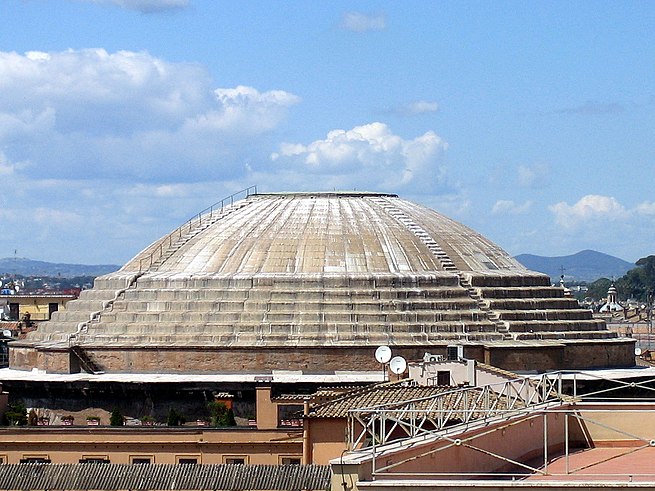
Main Difference
The main difference between Concrete and Ballast is that the Concrete is a composite construction material and Ballast is a material that is used to provide stability to a vehicle or structure.
-
Concrete
Concrete, usually Portland cement concrete (for its visual resemblance to Portland stone), is a composite material composed of fine and coarse aggregate bonded together with a fluid cement (cement paste) that hardens over time—most frequently in the past a lime-based cement binder, such as lime putty, but sometimes with other hydraulic cements, such as a calcium aluminate cement or Portland Cement. It is distinguished from other, non-cementitious types of concrete all binding some form of aggregate together, including asphalt concrete with a bitumen binder, which is frequently used for road surfaces, and polymer concretes that use polymers as a binder.
When aggregate is mixed with dry Portland cement and water, the mixture forms a fluid slurry that is easily poured and molded into shape. The cement reacts with the water and other ingredients to form a hard matrix that binds the materials together into a durable stone-like material that has many uses. Often, additives (such as pozzolans or superplasticizers) are included in the mixture to improve the physical properties of the wet mix or the finished material. Most concrete is poured with reinforcing materials (such as rebar) embedded to provide tensile strength, yielding reinforced concrete.
Concrete is one of the most frequently used building materials. Its usage worldwide, ton for ton, is twice that of steel, wood, plastics, and aluminum combined. Globally, the ready-mix concrete industry, the largest segment of the concrete market, is projected to exceed $600 billion in revenue by 2025.
-
Ballast
Ballast is material that is used to provide stability to a vehicle or structure. Ballast, other than cargo, may be placed in a vehicle, often a ship or the gondola of a balloon or airship, to provide stability. A compartment within a boat, ship, submarine, or other floating structure that holds water is called a ballast tank. Water should move in and out from the ballast tank to balance the ship. In a vessel that travels on the water, the ballast will remain below the water level, to counteract the effects of weight above the water level. The ballast may be redistributed in the vessel or disposed of altogether to change its effects on the movement of the vessel.
-
Concrete (adjective)
Real, actual, tangible.
“Fuzzy videotapes and distorted sound recordings are not concrete evidence that bigfoot exists.”
“Once arrested, I realized that handcuffs are concrete, even if my concept of what is legal wasn’t.”
-
Concrete (adjective)
Being or applying to actual things, not abstract qualities or categories.
-
Concrete (adjective)
Particular, specific, rather than general.
“While everyone else offered thoughts and prayers, she made a concrete proposal to help.”
“concrete ideas”
-
Concrete (adjective)
United by coalescence of separate particles, or liquid, into one mass or solid.
-
Concrete (adjective)
Made of concrete, a building material.
“The office building had concrete flower boxes out front.”
-
Concrete (noun)
A solid mass formed by the coalescence of separate particles; a compound substance, a concretion.
-
Concrete (noun)
Specifically, a building material created by mixing cement, water, and aggregate such as gravel and sand.
“The road was made of concrete that had been poured in large slabs.”
-
Concrete (noun)
A term designating both a quality and the subject in which it exists; a concrete term.
-
Concrete (noun)
Sugar boiled down from cane juice to a solid mass.
-
Concrete (noun)
A dessert of frozen custard with various toppings.
-
Concrete (verb)
To cover with or encase in concrete (building material).
“I hate grass, so I concreted over my lawn.”
-
Concrete (verb)
To solidify: to change from being abstract to being concrete (actual, real).
-
Concrete (verb)
To unite or coalesce into a mass or a solid body.
-
Ballast (noun)
Heavy material that is placed in the hold of a ship (or in the gondola of a balloon), to provide stability.
-
Ballast (noun)
Anything that steadies emotion or the mind.
-
Ballast (noun)
Coarse gravel or similar material laid to form a bed for roads or railroads, or in making concrete.
-
Ballast (noun)
A material, such as aggregate or precast concrete pavers, which employs its mass and the force of gravity to hold single-ply roof membranes in place.
-
Ballast (noun)
device used for stabilizing current in an electric circuit (e.g. in a tube lamp supply circuit)
-
Ballast (noun)
That which gives, or helps to maintain, uprightness, steadiness, and security.
-
Ballast (verb)
To stabilize or load a ship with ballast.
-
Ballast (verb)
To lay ballast on the bed of a railroad track.
-
Concrete (adjective)
existing in a material or physical form; not abstract
“concrete objects like stones”
-
Concrete (adjective)
specific; definite
“I haven’t got any concrete proof”
-
Concrete (adjective)
(of a noun) denoting a material object as opposed to an abstract quality, state, or action.
-
Concrete (noun)
a building material made from a mixture of broken stone or gravel, sand, cement, and water, which can be spread or poured into moulds and forms a mass resembling stone on hardening
“slabs of concrete”
“concrete blocks”
-
Concrete (verb)
cover (an area) with concrete
“the precious English countryside may soon be concreted over”
-
Concrete (verb)
fix in position with concrete
“the post is concreted into the ground”
-
Concrete (verb)
form (something) into a mass; solidify
“the juices of the plants are concreted upon the surface”
-
Concrete (verb)
make real or concrete instead of abstract
“concreting God into actual form of man”
